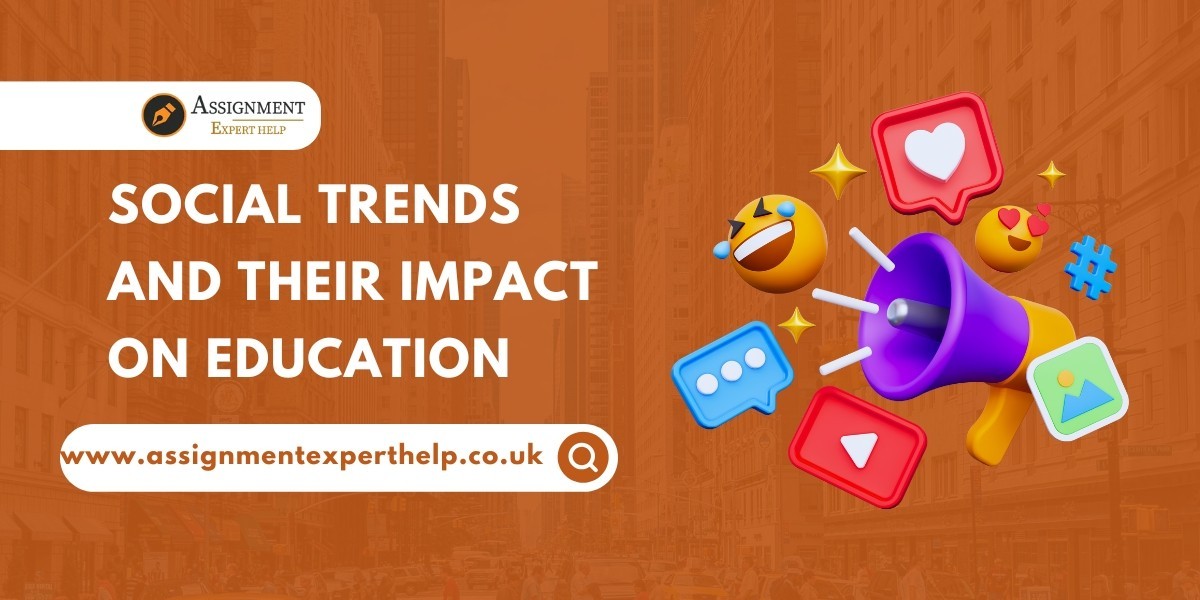A fundamental component of society, education is always changing to reflect and adapt to societal trends. The world is becoming more interconnected, and as society develops, so do the opportunities, challenges, and teaching strategies in the educational system.
These social trends, which range from changes in cultural attitudes to technological breakthroughs, have an impact on how education is accessed, provided, and viewed, often increasing the demand for academic writing help among students adapting to these shifts.
Primary Social Trends And Their Impact on Education
In this article, five primary social trends and their impact on education have been explored.
1. Digital Learning And Technological Advancements
The rapid advancement of technology in recent years is one of the most significant social trends. Education is no exception when technology is having a transformative effect on about every field. Because online courses, educational apps, and virtual classrooms are changing how learning happens, digitalisation is making education more individualised and accessible.
Geographic and economic barriers to education have broken down with the advent of the internet because it has facilitated online learning. From real-life discussions with instructors and peers to academic journals and videos, now students can access a gazillion resources.
There are challenges due to the shift to digital learning. There is a major issue of the digital divide, which is the disparity between people with and without access to technology. For online learning, the areas that are rural and disadvantaged communities struggle with the necessary infrastructure, but urban areas may have ready access to high-speed internet and devices. The discrepancy strengthens already-existing social stratification and inequality, making it worse than before.
2. Inclusivity And Cultural Shifts
The recognition of issues like gender, race, and sexual orientation has notably increased in recent years. This cultural shift has played a crucial role in shaping educational practices, resulting in inclusive environments that not only celebrate but also acknowledge diversity.
One of the most crucial areas affected by these social trends is gender equality in education. In developing countries, there has been a noticeable increase in the enrolment of girls in schools. This can be attributed to two main factors: first, international policies that advocate for equal access to education, and second, the evolution of societal norms. Consequently, gender equality in education serves as a vital area where social trends are making a positive impact, as more girls are allowed to pursue their education.
The rise of social movements such as Black Lives Matter, LGBTQ+ rights, and the push for decolonising education has led to calls for curriculum reforms that better reflect a variety of perspectives. The content related to the history and experience of marginalised groups is focused more on the curriculum of schools and universities. Marginalised groups, all of these things, provide an inclusive educational environment. The shift backs social justice as well as helping students to develop empathy, critical thinking, and a broader understanding of the world.
Inclusive education extends to students with disabilities. Furthermore, inclusive education extends to students with disabilities. As a result of the global trend towards inclusivity, accessible learning environments, in which people with physical and intellectual disabilities are given the tools and support they need to succeed, are becoming increasingly important. Individualised Education Plans (IEPs), specialised training for teachers, and adaptive technologies are included in it.
3. The Shift Towards Lifelong Learning.
Lifelong learning is another trend that emphasises the growing social trend. Many workers realise that the skills they acquired early in their careers are now insufficient to meet the demands of a rapidly changing economy. Automation, artificial intelligence, and other technological innovations are reshaping industries, creating a need for continuous skill development and retraining.
Education should not be limited to schools only, but it should be an ongoing process; this is the concept of lifelong learning. Governments, corporations, and academic institutions are providing opportunities for adults to further education. Workers are enabled to upskill and reskill throughout their lives through vocational training programmes, online certifications, and micro-credentials.
The role of higher education institutions and the nature of the workforce are both being reshaped through this trend. For students who are balancing work and family, universities are offering them flexible programmes, online degrees, and shorter, modular courses that are the best for non-traditional students. For business objectives that complement specialised learning opportunities, companies are collaborating with educational institutions to offer employees a more dynamic and adaptable workforce.
4. The Influence of Social Media On Education.
Social media is a dominant force in today’s world; it shapes the way people interact, share knowledge, and communicate. Facebook, Twitter, Instagram, etc., are not only social media platforms that are tools for socialising. These platforms also served as forums for discussion, learning, and knowledge exchange.
In the sector of education, social media has positive implications as well as negative ones. Social media allows users for collaborative learning, where students and educators can easily share resources, engage in real-time dialogues and discuss ideas. Online communities are devoted to particular academic fields or subjects in which peer-to-peer learning is encouraged, and a multitude are available.
But it should not be forgotten that social media can be a distraction in the classroom. Students struggle to stay focused when they are distracted by the sound of social media notifications. This is also a concerning issue on social media that biased content and misleading information are prevalent; this raises questions about the quality of information students are exposed to.
There are a number of educational institutions that are integrating social media into their curricula to teach students how to use and evaluate these platforms critically. To promote engagement and provide additional learning material, teachers use social media to connect with students outside the classroom. To keep students focused on their studies while getting online available knowledge, you should strike a balance.
5. Awareness of Mental Health in Education
Mental health is an important topic in education. The issue of awareness of mental health has grown. For the well-being of students, schools and universities are increasing their focus on it. Due to rising rates of stress, anxiety, and depression, educational institutions are taking a more proactive approach to mental health, especially among teenagers and young adults.
Counselling services, mindfulness programmes, and stress management workshops are offered in many schools. For the help of students to understand and manage their emotions and well-being, mental health education is also being integrated into the curriculum.
Conclusion
A dynamic interplay between technology, culture, economy, and society is shaping education today. These trends are transforming how teaching and learning are approached, from the rise of digital learning to a greater emphasis on inclusivity and mental health. The entire direction is towards flexibility, presentation, and greater access to education, while challenges like the digital divide and inequalities persist.
Educational systems must be adapted and respond according to the continually changing needs of society to iron out any potential difficulties, especially as these social trends continue to evolve. The integration of new technologies, an unchanging commitment to inclusivity, a focus on lifelong learning, mental well-being, and accessible academic assistance are all undoubtedly going to shape the future of education.



